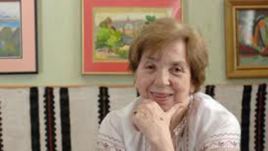In Memoriam: Iryna Stasiv-Kalynets

Iryna Stasiv-Kalynets, poet, artist and former political prisoner has died at the age of 71. Active in the Ukrainian national liberation and human rights movements, she was a person of strong convictions and steadfast commitment.
Iryna Stasiv was born on 6 December 1940 into a family of believers of the Ukrainian Greek Catholic Church and many of her relatives were connected with the Organization of Ukrainian Nationalists. Seeing mass deportations of Ukrainians to Siberia after the War, she became and remained passionately committed to Ukraine’s independence.
She studied at the Language and Literature Faculty of Lviv University and then worked in schools and youth clubs, but was forced to leave after telling the students about the history of the national liberation movement. From then on she was able to get only temporary jobs, or manual labour.
She and her husband, Ihor Kalynets, were actively involved in the Shistdesyatnyky (sixties) movement.
In July 1970 she was one of 9 people from Lviv who signed a letter of protest against the arrest of Valentin Moroz, and was active in other efforts on his behalf. In December 1971 she signed the statement announcing the creation of the Public Committee in defence of Nina Strokata.
Both she and her husband were arrested in 1972. Iryna Stasiv-Kalynets was sentenced in early August under Article 62 § 1 (“anti-Soviet agitation and propaganda”) to 6 years labour camp and 3 years exile. Six months later her husband received the same sentence. Their small daughter was separated from her parents for 9 years.
Stasiv-Kalynets served her sentence in the Mordovian political labour camps together with Stefania Shabatura, Nadia Svitlychna and Nina Strokata.
She took part in all collective protest actions held in the women’s political prisoners’ camp. She signed a letter to the Prosecutor’s office accusing the camp authorities of preventing prisoners celebrate Easter; a letter to the Secretary General of the UN asking that he take measures to ensure the conducting of fair trials in the presence of representatives of the UN; a collective letter in support of Andrei Sakharov, an appeal to the camp administration for permission both to make donations to the Support Fund for victims of the Pinochet coup in Chile, and to send delegates to the Congress of the International Women’s Democratic Association. She took part in a hunger strike demanding that they be given political prisoner status, refused to do hard physical labour in connection with International Women’s Year, wrote a letter to the UN Human Rights Committee protesting at the camp conditions and asking for a representative to be sent to the camp, and held hunger strikes in protest at refusals to allow visits from relatives and friends. For such actions, she was frequently subjected to vicious repressive measures by the camp authorities.
She spent her term of exile together with her husband in the Chytynsk region, working milking cows and painting houses.
From 1987 Iryna Stasiv-Kalynets took an ever more active role in the revival of free cultural and civic life in Lviv. In November 1987 she and her husband became founding members of the Ukrainian Association for the independent creative intelligentsia. She was also active in creating and working with the group “Yevshan-zillya” in publishing an independent cultural journal, as well as in the creation of the Association of the Ukrainian Language, “Memorial” and the Popular Movement of Ukraine (Rukh). Stasiv-Kalynets was also involved in the movement for the revival of the Ukrainian Greek-Catholic Church (
She believed that the rights of the nation are given priority over the rights of the individual.
She published several books of poetry, prose, as well as works on literary and historical subjects.





